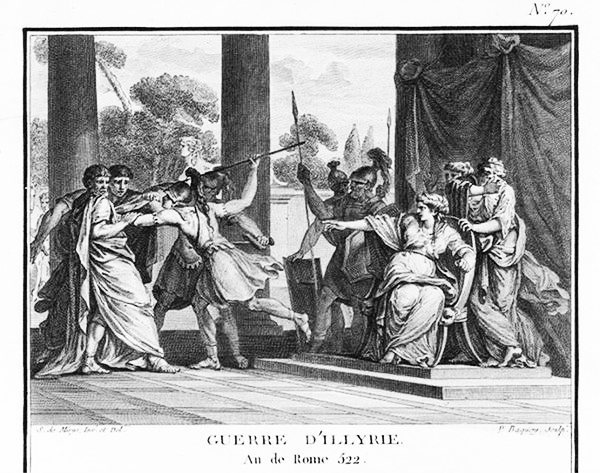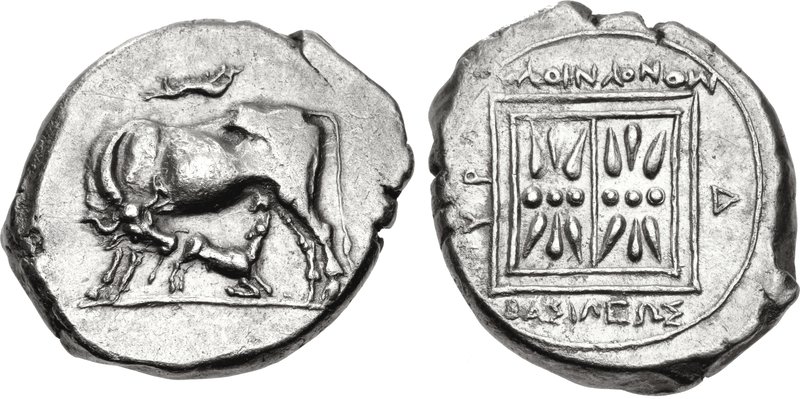|
Siege Of Epidamnus
Two invasions of Epidamnus by Illyrian forces deployed by Queen Teuta attacking the Greek cities of Epirus took place as part of the Illyrian Wars in spring 229 BC. Prelude In 230 BC, the Illyrians had defeated an Epirote army of Battle of Phoenice, Phoenice and prepared to engage a second Greek army, but were called back by Queen Teuta to stop an Illyrian defection to Dardania.The Illyrians, J. J. Wilkes, 1992, , p. 86, "...including the names of Dardanian rulers, Longarus, Bato, Monunius and Etuta, and those on later epitaphs, Epicadus, Scerviaedus, Tuta, Times and Cinna. Other Dardanian names are linked with..." Teuta quickly crushed the revolt, and set about taking control of remaining territories in the Adriatic not already under Illyrian control. She began the siege of Issa the same year and sent a large fleet into the Adriatic, which attacked Epidamnus, Corcyra and Apollonia in spring 229 BC. The battle The Illyrians landed at the port of Epidamnus in spring 229 BC, with the ... [...More Info...] [...Related Items...] OR: [Wikipedia] [Google] [Baidu] |
Epirus
sq, Epiri rup, Epiru , native_name_lang = , settlement_type = Historical region , image_map = Epirus antiquus tabula.jpg , map_alt = , map_caption = Map of ancient Epirus by Heinrich Kiepert, 1902 , coordinates = , coor_pinpoint = , coordinates_footnotes = , subdivision_type = Present status , subdivision_name = Divided between Greece and Albania [Baidu] |
Illyrian Wars
The Illyro-Roman Wars were a series of wars fought between the Roman Republic and the Ardiaei kingdom. In the ''First Illyrian War'', which lasted from 229 BC to 228 BC, Rome's concern was that the trade across the Adriatic Sea increased after the First Punic War at a time when Ardiaei power increased under queen Teuta. Attacks on trading vessels of Rome's Italic allies by Illyrian pirates and the death of a Roman envoy named Coruncanius on Teuta's orders,Zock, 99. prompted the Roman senate to dispatch a Roman army under the command of the consuls Lucius Postumius Albinus and Gnaeus Fulvius Centumalus. Rome expelled Illyrian garrisons from a number of Greek cities including Epidamnus, Apollonia, Corcyra, Pharos and established a protectorate over these Greek towns. The Romans also set up Demetrius of Pharos as a power in Illyria to counterbalance the power of Teuta.Eckstein, 46–59. The ''Second Illyrian War'' lasted from 220 BC to 219 BC. In 219 BC, the Roman Republic was at w ... [...More Info...] [...Related Items...] OR: [Wikipedia] [Google] [Baidu] |
Battle Of Phoenice
The Battle of Phoenice was a battle that took place in 230 BC between the forces of the Epirote League and the Ardiaean Kingdom of Illyria. Illyrian Invasion of Epirus and Battle Phoenice had been previously taken by Illyrians acting under Queen Teuta, in 230 BC, after a Gaulish garrison of 800 men surrendered to the larger Illyrian force. In reaction, the Epirote League sent in an army to retake Phoenice. They took up positions at a river outside of Phoenice. Meanwhile, 5,000 Illyrians under Scerdilaidas had advanced inland into Epirus from Southern Illyria and reached a pass just outside Antigoneia. The Epirotes reacted by dividing their army, sending a small detachment to protect Antigoneia whilst keeping their main body outside of Phoenice. The Illyrians at Phoenice, seeing the Epirote army was divided, advanced towards their camp and crossed the river. The next day, the forces engaged each other in battle. The Epirote forces were routed and badly defeated, with many being ... [...More Info...] [...Related Items...] OR: [Wikipedia] [Google] [Baidu] |
Epidamnus
The ancient Greek city of Epidamnos or Epidamnus ( grc-gre, Ἐπίδαμνος), ( sq, Epidamni) later the Roman Dyrrachium (Δυρράχιον) ( sq, Dyrrahu) (modern Durrës, Albania), was founded in 627 BC in Illyria by a group of colonists from Corinth and Corcyra (modern Corfu). Rhodes, P.J. ''A History of the Classical Greek World 478-323 BC''. 2nd edition. Chichester: Wiley-Blackwell, 2010, p. 88. Aristotle's ''Politics'' several times draws for examples on the internal government of Epidamnos, which was run as a tight oligarchy that appointed a ruling magistrate; tradesmen and craftsmen were excluded from power, until internal strife produced a more democratic government. The exiled oligarchs appealed to Corcyra while the democrats enlisted the help of Corinth, initiating a struggle between the two mother cities described by Thucydides as a cause of the Peloponnesian War. Individual trading with the local Illyrians was forbidden at Epidamnos: all traffic was through the ... [...More Info...] [...Related Items...] OR: [Wikipedia] [Google] [Baidu] |
Durrës
Durrës ( , ; sq-definite, Durrësi) is the second most populous city of the Republic of Albania and seat of Durrës County and Durrës Municipality. It is located on a flat plain along the Albanian Adriatic Sea Coast between the mouths of the Erzen and Ishëm at the southeastern corner of the Adriatic Sea. Durrës' climate is profoundly influenced by a seasonal Mediterranean climate. Durrës was founded by Ancient Greek colonists from Corinth and Corcyra under the name of Epidamnos around the 7th century BC in cooperation with the local Illyrian Taulantii. Also known as Dyrrachium, Durrës essentially developed as it became an integral part of the Roman Empire and its successor the Byzantine Empire. The Via Egnatia, the continuation of the Via Appia, started in the city and led across the interior of the Balkan Peninsula to Constantinople in the east. In the Middle Ages, Durrës was contested between Bulgarian, Venetian and Ottoman dominions. The Ottomans ultimatel ... [...More Info...] [...Related Items...] OR: [Wikipedia] [Google] [Baidu] |
Albania
Albania ( ; sq, Shqipëri or ), or , also or . officially the Republic of Albania ( sq, Republika e Shqipërisë), is a country in Southeastern Europe. It is located on the Adriatic and Ionian Seas within the Mediterranean Sea and shares land borders with Montenegro to the northwest, Kosovo to the northeast, North Macedonia to the east and Greece to the south. Tirana is its capital and largest city, followed by Durrës, Vlorë, and Shkodër. Albania displays varied climatic, geological, hydrological, and morphological conditions, defined in an area of . It possesses significant diversity with the landscape ranging from the snow-capped mountains in the Albanian Alps as well as the Korab, Skanderbeg, Pindus and Ceraunian Mountains to the hot and sunny coasts of the Albanian Adriatic and Ionian Sea along the Mediterranean Sea. Albania has been inhabited by different civilisations over time, such as the Illyrians, Thracians, Greeks, Romans, Byzantines, Venetians, and Ot ... [...More Info...] [...Related Items...] OR: [Wikipedia] [Google] [Baidu] |
List Of Rulers In Illyria
The Illyrians, ; la, Illyrii}) were a conglomeration of Indo-European peoples and tribes in the Balkan Peninsula, Southeastern Europe. They spoke the Illyrian language and practiced a multitude of common religious and cultural practices. Many of Illyrian groups formed a distinct tribal mode of social organisation, which survived much later in the form of the Albanian tribal system. In late Iron Age and early classical antiquity, the first polities of the area would be created by tribal groupings, including the Taulantii and Dardani. The most powerful Illyrian states of the area, the Ardiaean kingdom, emerged in the 3rd century BC during the rule of Agron and Teuta. The Illyrians came into conflict with Roman Republic and were defeated in the Illyrian Wars, which were followed by many revolts. The largest and last of them was the Great Illyrian Revolt (6-9 BC). The beginning of the integration of the region of Illyria in the Roman world followed the revolt and saw man ... [...More Info...] [...Related Items...] OR: [Wikipedia] [Google] [Baidu] |
Teuta Of Illyria
Teuta ( Illyrian: *''Teutana'', 'mistress of the people, queen'; grc, Τεύτα; lat, Teuta) was the queen regent of the Ardiaei tribe in Illyria, who reigned approximately from 231 BC to 228/227 BC. Following the death of her spouse Agron in 231 BC, she assumed the regency of the Ardiaean Kingdom for her stepson Pinnes, continuing Agron's policy of expansion in the Adriatic Sea, in the context of an ongoing conflict with the Roman Republic regarding the effects of Illyrian piracy on regional trade. The death of one of the Roman ambassadors at the hands of Illyrian pirates gave Rome the occasion to declare war against her in 229 BC. She surrendered after losing the First Illyrian War in 228. Teuta had to relinquish the southern parts of her territory and pay a tribute to Rome, but was eventually allowed to keep a realm confined to an area north of Lissus (modern Lezhë). Biographical details on the life of Teuta are biased by the fact that surviving ancient sources, wh ... [...More Info...] [...Related Items...] OR: [Wikipedia] [Google] [Baidu] |
First Illyrian War
The Illyro-Roman Wars were a series of wars fought between the Roman Republic and the Ardiaei kingdom. In the ''First Illyrian War'', which lasted from 229 BC to 228 BC, Rome's concern was that the trade across the Adriatic Sea increased after the First Punic War at a time when Ardiaei power increased under queen Teuta. Attacks on trading vessels of Rome's Italic allies by Illyrian pirates and the death of a Roman envoy named Coruncanius on Teuta's orders,Zock, 99. prompted the Roman senate to dispatch a Roman army under the command of the consuls Lucius Postumius Albinus (consul 234 BC), Lucius Postumius Albinus and Gnaeus Fulvius Centumalus. Rome expelled Illyrians, Illyrian garrisons from a number of Greece, Greek cities including Epidamnus, Apollonia (Illyria), Apollonia, Korkyra (polis), Corcyra, Hvar, Pharos and established a protectorate over these Greek towns. The Ancient Rome, Romans also set up Demetrius of Pharos as a power in Illyria to counterbalance the power of Teuta.E ... [...More Info...] [...Related Items...] OR: [Wikipedia] [Google] [Baidu] |
229 BC
__NOTOC__ Year 229 BC was a year of the pre-Julian Roman calendar. At the time it was known as the Year of the Consulship of Albinus and Centumalus (or, less frequently, year 525 ''Ab urbe condita''). The denomination 229 BC for this year has been used since the early medieval period, when the Anno Domini calendar era became the prevalent method in Europe for naming years. Events By place Anatolia * Attalus I of Pergamon wins the Battle of the Harpasus in western Anatolia. Illyria * The First Illyrian War starts when the Roman Senate dispatches an army under the command of the consuls Lucius Postumius Albinus and Gnaeus Fulvius Centumalus to Illyria. Rome forces the withdrawal of Illyrian garrisons in the Greek cities of Epidamnus, Apollonia, Corcyra and Pharos and establishes a protectorate over these Greek towns. * The Illyrian tribe of the Ardiaei is subdued by the Romans. * The King of Macedonia, Demetrius II, dies. His nephew, Antigonus III comes to the Mac ... [...More Info...] [...Related Items...] OR: [Wikipedia] [Google] [Baidu] |
220s BC Conflicts
S, or s, is the nineteenth letter in the Latin alphabet, used in the modern English alphabet, the alphabets of other western European languages and others worldwide. Its name in English is ''ess'' (pronounced ), plural ''esses''. History Origin Northwest Semitic šîn represented a voiceless postalveolar fricative (as in 'ip'). It originated most likely as a pictogram of a tooth () and represented the phoneme via the acrophonic principle. Ancient Greek did not have a phoneme, so the derived Greek letter sigma () came to represent the voiceless alveolar sibilant . While the letter shape Σ continues Phoenician ''šîn'', its name ''sigma'' is taken from the letter ''samekh'', while the shape and position of ''samekh'' but name of ''šîn'' is continued in the '' xi''. Within Greek, the name of ''sigma'' was influenced by its association with the Greek word (earlier ) "to hiss". The original name of the letter "sigma" may have been ''san'', but due to the ... [...More Info...] [...Related Items...] OR: [Wikipedia] [Google] [Baidu] |



